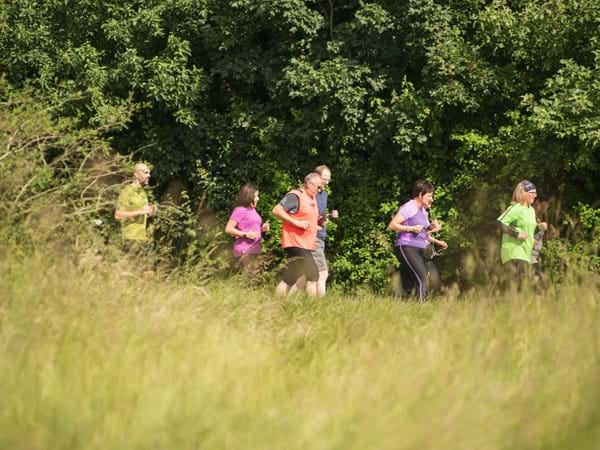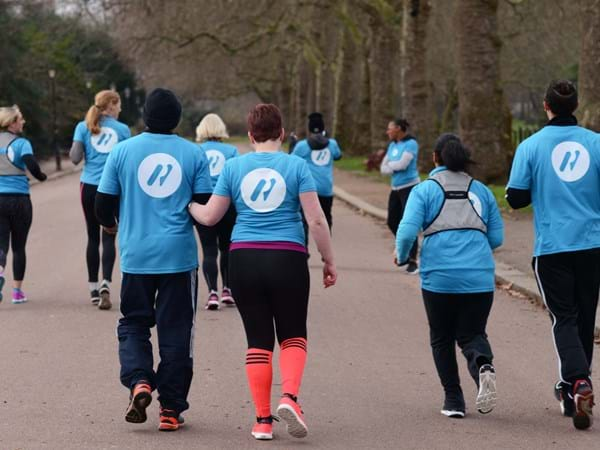
Preparing for your first event or race
Why take part in running events & races?
Because this girl can and never thought she could! I was always a spectator, never a participator. So many times I supported friends and family from the sidelines, but there was always part of me that wanted to be involved. Now, finally I am. Entering a race is always the hardest part. It can be nerve-wracking, and you aren’t sure you’ll ever be ready, but when you arrive, run and finally cross that finish line, you feel amazing. There’s a huge sense of personal achievement. I’ve done this, no one else but me. Even when you find the running hard, the minute you’re done you just think “Wow. That was amazing!” I haven’t done a lot of races, and I’m no athlete, but then I don’t run to become an athlete.
I run because it gives me the opportunity to challenge myself and try my best at something. My attitude is that it doesn’t matter if I come first or last - the most important thing is that I've bothered to make the effort. Hopefully that means I’m setting a great example to my kids, and possibly inspiring others. That’s not to say I don’t get nervous, or don’t prepare a little to make sure I arrive at the starting line feeling calm, healthy, and ready to run my best. So, with that in mind, here are a few things I've learnt and would like to share with first-timers to make sure you enjoy the day as much as possible.
The week before the race...
Don't get stressed and worry.
5Ks are hugely positive community events, and people with a very wide range of abilities and levels of fitness do them. You get to spend a morning with strangers cheering you on, and celebrating doing something healthy for yourself.
Run a little further.
If you haven't completed a full 5k before, it's best to run a little further every time you train. Running the full distance isn't essential, but it's great to get close so you know you can do it comfortably. The crowd and atmosphere will give you the extra push you need on race day - trust me.
Familiarise yourself with the route.
Most runs have a map of the route on their website, so take some time to check where you’ll be running. Finding out where the start is beforehand will also prevent you from getting lost on race morning and having a wobble about being late!
Think positive.
Be your own cheerleader and keep telling yourself you can do it.

The Day Before the Event / Race...
Rest.
I don't run the day before a race. I think it’s better to give your body a proper rest. So put your feet up, eat a healthy dinner and drink plenty of water so you’ll be nice and hydrated.
Get everything ready.
Before I go to bed I always lay out what I'm wearing and put some snacks, a fresh top and any personal items into a little rucksack. I also pin my race number onto my top. Not only is it exciting to see your race outfit ready, but fastening your number is a fiddly business, and I’ve learnt from experience that it’s stressful messing around with safety pins just before the start!
Plan your journey.
I like to decide what time I’m going to leave the house, map my route to the race and find out about parking. It’s good to arrive early, so a little planning helps.
The day of the event / race...
Breakfast of champions.
Don’t eat anything heavy within two hours of the race. Some people eat breakfast. Some don't. Do what works for you. I like to eat a small bowl of natural Greek yoghurt with some blueberries and mixed nuts.
Give yourself time.
Get to the race at least one hour before the start. That way you’ll have time to pick up your number (if you don’t already have it), use the toilets (there is usually a queue) and warm up. You don’t want to be running to the starting line.
Limit your fluid intake.
Yes, you need to stay hydrated, but you don't want to guzzle your drink all at once and have a tummy full of water sloshing around. Too much water makes me feel bloated and heavy.
Don’t overdress.
It will probably be cool at the start, but you’ll quickly warm up once your running, and trying to run whilst tying a jacket around your waist is no fun. If you have supporters in tow ask them to take your jacket or jumper. If not, most runs have secure places to store personal belongings.
Line up early.
You don’t want to be rushing to the starting line, so don’t wait for the last call to get there.
Set small goals.
It doesn't have to have anything to do with your finishing time - how about running up the hills rather than walking them, or taking a few less breathers than normal? It'll give you a real boost.
Start slow, and stay even.
Try to keep an even pace throughout the race, and save your extra energy for a sprint to the finish! This doesn't happen often for me, but it has been done!

After the race...
Keep moving.
Get your medal and keep walking. Staying mobile prevents stiffness and will gradually bring your heart rate down. When you’re ready, do some recovery stretches to loosen your legs, back, and hips.
Refuel.
There are usually snacks at the finish line, but to recover quickly consider bringing your own sports recovery drink, energy bar, or other packaged food that won’t spoil, spill, or get ruined in transit.
Get warm.
Change out of the clothes you ran in, and get into dry clothes as soon as possible. After you cross the finish line, your temperature will start to drop fast, and keeping sweaty clothes on will make you cold.
The next day, get going.
As sore as you might feel the day after the race, it’s important to do some gentle exercise. Swimming or cycling will increase circulation to your sore muscles and help you bounce back more quickly.

"And finally, give yourself a pat on the back! The day after the race look back and think wow, look at what I’ve achieved! You never know, you might just find yourself browsing the Internet looking for your next race."